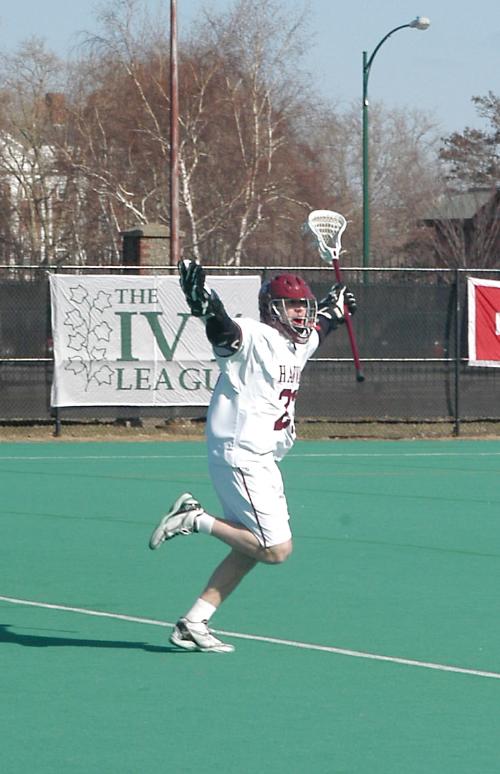
News
Summers Will Not Finish Semester of Teaching as Harvard Investigates Epstein Ties

News
Harvard College Students Report Favoring Divestment from Israel in HUA Survey

News
‘He Should Resign’: Harvard Undergrads Take Hard Line Against Summers Over Epstein Scandal

News
Harvard To Launch New Investigation Into Epstein’s Ties to Summers, Other University Affiliates

News
Harvard Students To Vote on Divestment From Israel in Inaugural HUA Election Survey
NCAA Awards Surprise Bid
After mourning end of season, Harvard gets another chance on Sunday

After Saturday’s triple-overtime loss to Dartmouth, everyone on the
Harvard men’s lacrosse team thought the season was over—and no one was
satisfied.
This had been their year to make the tournament, their year to
show the national lacrosse community that the Crimson was a force to
reckon with.
After the bids were announced last Sunday night, everything changed.
To the surprise of coaches, players, and fans, the Crimson
received one of the 10 at-large bids handed out by the Division I men’s
lacrosse selection committee to enter the NCAA tournament unseeded.
The squad will try and get through Syracuse on Sunday in
order to face either Penn or Johns Hopkins in the second round of play,
which is as far as it reached in its last tournament appearance in
1996. The selection is the team’s fifth overall.
“Syracuse, it’s like the mecca of lacrosse up there,”
co-captain Jake Samuelson said. “We’re excited because if we could’ve
played anyone, this is who we really wanted.”
Before the game against the Big Green, the squad needed a
number of games to go a certain way: Hofstra to beat Delaware, Johns
Hopkins to defeat Loyola, Georgetown over Penn State, Syracuse over
Colgate, Ohio State’s to beat Army, and Albany to defeat Stony Brook.
After each match went as the Crimson hoped, Harvard’s fate rested in its own hands.
But for the first time that weekend, things did not go as the
Crimson wanted: the 14-13 Dartmouth victory seemed to end all hopes for
a berth.
“We had a reception and seniors were talking about how we were
going to miss each other, how we wished we had one more game,”
Samuelson said. “It’s like redemption, like we’re back from the dead.”
So the question still remains, how did this happen?
Last Saturday six spots had already been decided, including
Cornell, Denver, and Navy, while the committee filled the other ten
bids on Sunday.
According to primary selection criteria, at-large teams are
selected based on three major categories: wins against teams in
descending order of ranking in the ratings percentage index (RPI)—1-5
is worth five points, 6-10 four points, 11-15 three points, 16-20 two
points, and all other wins one point—in addition to strength of
schedule index, determined by how each team performs against its tough
opponents; and normal RPI rank, based on winning percentage, opponent’s
record, and opponent’s strength of schedule.
Harvard stacks up at 19th in the first category and 17th in
the other two. So there must have been something else at play in the
decision, given that only 16 teams are selected.
“I wasn’t surprised, but [before the announcement] I really
was unsure of the outcome,” Crimson coach Scott Anderson said. “There
are all kinds of factors that can be considered. I know by the factors
that ultimately turned out to be most important [that] we would be
strong, but there’s always an element of subjectivity.”
According to Anderson, it is likely that quality wins and
strength of schedule were highly weighted, as the squad notched 14th in
the former and sixth in the latter.
In addition to taking a victory against Penn, Harvard defeated
Denver, who received an automatic bid, and Stony Brook, who was on the
bubble.
Three other Ivy League teams—the Quakers, Princeton, and
Cornell—will also enter tournament play this weekend, which may have
bolstered Harvard’s resume.
“All four teams that are in had quality wins,” Anderson said.
“It was very similar to what happens in a league like the ACC that
competes in a league tournament to allow themselves to use each other
as quality wins: it supports your strength of schedule. That’s
happening in a more natural way in our league.”
In the end, it does not matter how the Crimson reached the
tournament. This weekend, Harvard is going to go out and show that the
team is exactly where it should be.
“We’ve seen people talking about other teams that should’ve
made it over us—they think Syracuse will pound us,” Samuelson said. “We
have something to prove. We don’t think it’s a mistake—we’re ready to
go. It’s not something we take lightly.”
—Staff writer Madeleine I. Shapiro can be reached at mshapiro@fas.harvard.edu.
Want to keep up with breaking news? Subscribe to our email newsletter.
